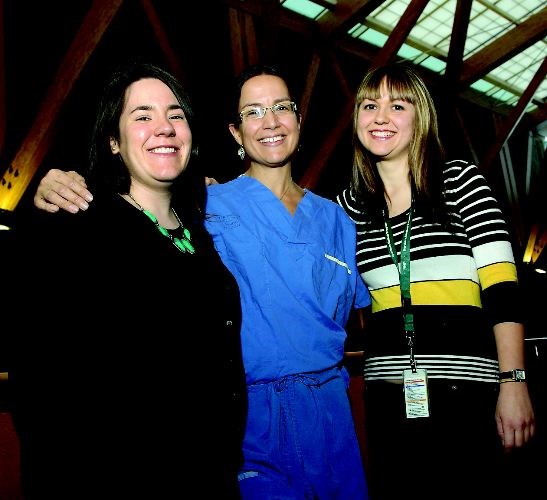After coming to northern B.C. to study, Joanna Paterson became acutely aware of the health challenges Aboriginal people face and realized if she wanted to practice medicine here she needed to know more.
Paterson got that opportunity when she was one of three local students who attended public health courses at the Centre for American Indian Health at John Hopkins University in Baltimore last summer. Next month she's going back for more education at the prestigious institution.
"Since beginning my masters at UNBC I have been introduced to some of the health disparities facing northern and Aboriginal populations, but these courses strengthened that understanding through real world examples," said Paterson, a masters of health sciences student at UNBC.
Paterson, Natalja Tchajkova and Stephen Bennett all attended courses this summer, including one taught by Dr. Nadine Caron, a teaching surgeon at the Northern Medical Program.
Caron has been on the faculty at John Hopkins since 2009 and has been able to bring her perspective as a First Nations physician in Canada to the American environment during week-long intensive courses twice a year.
"They were looking at Native American [issues] and I started adding some perspectives of First Nations, Inuit, Metis in Canada, which the students and the faculty found very fascinating, recognizing that countries with indigenous populations had a lot of overlapping issues," she said.
There's now a memorandum of understanding between the Centre for American Indian Health and UBC's medical school, which has opened the door to B.C. students accessing the summer and winter intensive institute courses.
This past summer Caron taught a course on data management and in January she will be teaching a class on multi-disciplinary approaches to public health, through an Aboriginal lens.
Paterson is looking forward to Caron's course next month as well as another one on mental health, plus reconnecting with classmates from the summer program.
"The things I learned the most were outside the classroom," she said. "While the content was really interesting and it was great to learn in that environment, I'm looking forward to meeting up with people I met in the summer to learn outside of the classroom again."
Bennett, a masters in counselling student at UNBC, agreed that the connections he made this summer will pay dividends down the road. An aspiring pediatric oncologist, Bennett hopes to work closely with Aboriginal communities during his career and said the courses gave him a network he can draw on down the road.
"One of the biggest things was getting hands-on experience," he said. "A lot of our classmates were Aboriginal, so getting to share in that dialogue that takes place between people is really valuable."
Tchajkova, a third-year medical student in the Northern Medical Program, said the summer courses helped her expand her views on medicine. She said by learning to look at things from an Aboriginal perspective, it will allow her to apply those concepts when dealing with all types of patients.
"It allows you to tackle issues in health care in a more comprehensive way," she said. "You realize that solutions aren't always narrow, that there are other avenues you can take."
The intensive courses are open to all John Hopkins students, with many Apache, Navajo and Pueblo peoples from the southwestern United States are enrolled in the program.
Both Paterson and Bennett learned about the program through the pre-med club at UNBC and decided to apply. They had to submit a one-paragraph statement of interest and go through an interview process in order to be selected.
"I thought it was a long shot, but I decided to put my name in the mix and I'm really glad I did," Paterson said.
Caron said it's important for students like Paterson to get ample opportunity to take part in the Hopkins program.
"Part of it is exposing as many students as you can to this experience, but at the same time, making sure you provide enough opportunity for the ones that you give this glimpse of public health to, so that they can really take it and run on their own," Caron said. "In my experience a couple trips down is what does it, after that they rely on no one from anything."
Caron is looking to secure permanent funding for the student exchanges so that she can bring students from the north to Baltimore annually. Groups like UNBC, UBC's Northern Medical Progam, the Canadian Breast Cancer Foundation and Kloshe Tillicum - an Aboriginal health research group in B.C. and the Yukon - have contributed financial support in the past.



